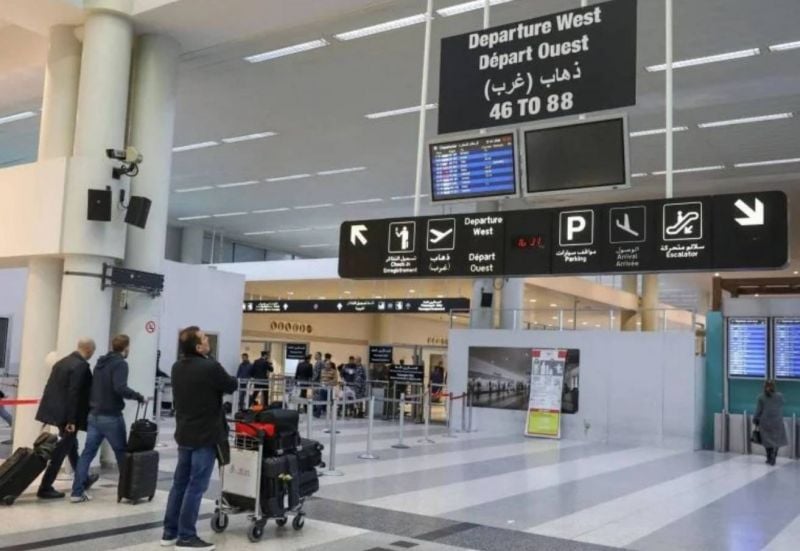
(Credit: AFP archive photo)
Since the outbreak of the Hamas-Israel war on Oct. 7, Lebanese citizens and foreign nationals alike have been on edge, monitoring the developments at the country’s southern border and watching for the slightest signs of conflict spillover. The country's expats and dual nationals face added uncertainty after embassies have heightened security warnings. While some have decided to pack their bags, others are giving it some time, and many more can't seem to make up their minds.
Many students have found themselves in this unprecedented situation. Leila*, a 24-year-old Egyptian student studying International Relations at AUB, says she is "worried" and fears the situation "may deteriorate rapidly in Lebanon." "My parents are not pressuring me yet but are concerned," she says. For now, Leila prefers to "wait a bit longer to see what will happen." In the meantime, she is preparing for the possibility of departure and hopes that her university will move classes online.
Participating in an exchange program at a French-speaking Lebanese university, Jean*, aged 20, lives with a host family. "Perhaps that's why I'm not panicking as much as other French students who live in shared housing," he says. While his French faculty "strongly encourages students to return," he prefers to wait for an embassy directive, "which is not the case at the moment," he says. Jean wants to stay in Lebanon and has opted to travel for a few days to observe how things will evolve. Meanwhile, most exchange students "have already left or are preparing to do so," he says.
Andreas, an 18-year-old Lebanese-Austrian student, says leaving for Austria "is not an option for [his] family right now." Even though living in Austria is an option, Andreas's parents don’t want to abandon the school they established in Lebanon. "If war breaks out, we would prefer to take refuge in the mountains," he says.
Of all the students interviewed, Merilin, a 21-year-old Lebanese-Ukrainian master's student, faces the most complex decision. Her family is caught between two war-torn and crisis-ridden countries. She hopes the situation will not worsen and says her decision to stay in Lebanon is definite.
‘Lebanese people deserve nothing but peace’
Professionals of various nationalities who have settled in Lebanon are also facing the dilemma. This is the case for Peter*, a consultant working with an NGO focused on migration. Peter monitors expatriate WhatsApp groups to follow the evolving events. "The majority of my foreign friends are still here. They will only leave if their embassies instruct them to," he says. “But none of us wants to leave. We have many Lebanese friends. We know their stories. They deserve nothing but peace.”
For Antje, a former German journalist residing in Lebanon to improve her Arabic skills, the decision to leave will only be made if "Lebanon clearly enters into war or if [her] embassy gives clear guidelines." Even in that case, she says she would stay in the region and probably go to Turkey, so she can easily return to Lebanon once the storm has passed. She says she doesn’t want to leave the country.
Frank, a 47-year-old entrepreneur who is married to a Lebanese woman is worried about “the impact of recent French positions [on the Hamas-Israel war] on how we are perceived here.”
Fritz, a 46-year-old German man, volunteers for an NGO in Akkar and has been in Lebanon for ten years. "I'm worried, of course, like everyone else," he says. But he can't see himself leaving the region "unless the whole village where we are based is evacuated." He would feel bad "abandoning all these people," he says. His colleague Yang, a 29-year-old Chinese man, is relying on the NGO to decide whether or not to evacuate.
"And then we are in Akkar, local residents told me that in 2006, the Israelis only bombed the infrastructure, not the houses, so I don't feel very worried," says Yang.
Ruben, a 40-year-old Dutchman living in Tripoli with his Lebanese wife, where they run a cultural cafe, has been considering his options. "So far, I wasn't really worried, but my wife is beginning to fear that the war will spread to Lebanon," he says. The couple is now considering leaving, albeit temporarily. "My fear is that the airport will close," he says.
*Names have been changed to ensure privacy.
This article was originally published in French in L'Orient-Le Jour.
